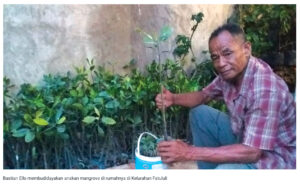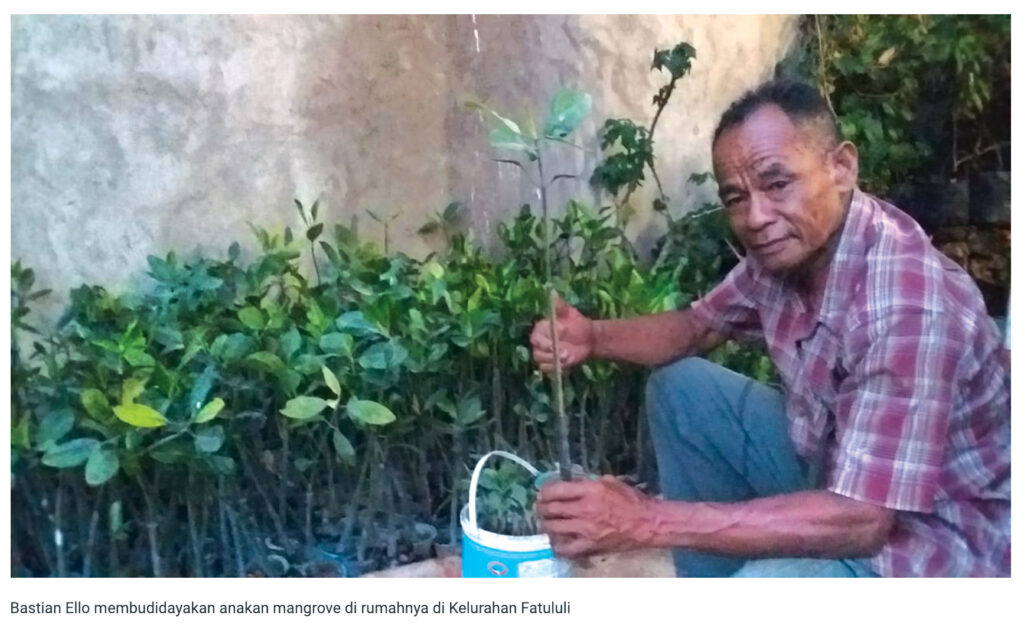Protecting God’s Home
Rebecca teaches at the Graduate School of the Faculty of Theology of Artha Wacana University (GMIT) in Indonesia.
Indonesia is a vast archipelago made up of 17,508 islands extending further than the distance from San Francisco to Bermuda. A large part of the islands was once covered by rain forest. Although the forest is being decimated at an alarming rate to sell the lumber, grow palm oil trees, and dig up coal, the Indonesian islands still serve as part of the “lungs of the world,” providing forests that recycle the world’s carbon dioxide back into breathable oxygen again.
In addition to deforestation, Indonesia as a nation is facing a huge problem that in the past the US has also faced: what to do with the trash that is piling up. Like New York City, there have been barges sailing around the islands with nowhere to unload their cargo of trash. Indonesia doesn’t have the anti-littering laws and clean-up campaigns that the US has. If you think about how much littering goes on in the US even with laws and campaigns, imagine how much worse it might be without them. The most appalling sign I have seen here was one that read, “Keep our town clean. Throw your trash in the river.”
Until just a few decades ago, Indonesians wrapped everything in banana leaves, which are abundant throughout these tropical islands. It was acceptable to drop the used leaves on the ground or in a nearby stream because they are biodegradable. The Indonesians now use plastic to wrap everything, just as we do in the west, but they still throw the wrapping on the ground. Thus, the amount of plastic thrown away everywhere is shocking, most especially in rivers and the ocean.

Love God, plant mangroves: Bastian Ello, a member of GMIT, has responded to his church’s “green revolution” by planting over 50,000 mangrove trees.
A disastrous impact from the mounting trash piles is the disease that spreads to people and living beings in the vicinity. Another issue is that birds, fish, and other animals can’t differentiate between food and plastic. They try to eat the plastic, which then gets lodged in their digestive system and eventually they starve. Last year at a local zoo, 125 animals, including giraffes and wild goats, died because their stomachs were filled with plastic, thrown on the ground by zoo visitors. There is no way to measure how many similar deaths happen in the wild.
The Christian church in Indonesia seeks to raise awareness by taking a theological approach to the issue. This world is God’s gift to us. In the book of Genesis, God declares that creation is good. After creating humankind, God commands us to be faithful stewards of the land. Since we have been commanded to care for the earth, not to exploit it heedlessly. Therefore, it’s important to remember that our definition of sin does not only include personal habits like lying or stealing, but also the destruction of God’s good creation through pollution and littering. If we remember that the earth is our home, then heedlessly throwing trash on the ground is a form of domestic violence toward the earth and our fellow inhabitants.
One of the ways that we can help the church in Indonesia is to avoid the use of palm oil. Palm oil continues to be one of the leading drivers of deforestation and Indonesia is the world’s largest producer of palm oil. Indonesia is home to 10% to 15% of all known plants, mammals, and birds on the planet. Many rare animal species can only be found in Indonesia’s forests, including orangutans, Sumatran tigers, birds, and rhinos, and are increasingly threatened by extinction.
Unfortunately, a large number of our processed foods, particularly crackers and cookies, cosmetics, and cleaning products contain palm oil. Even many soaps labeled ‘natural’ will contain palm oil. One environmental group issued a report, “Dying for a Cookie,” about how the natural world in Indonesia is being wiped out wholesale so that we can eat our Oreos and Ritz and Mars bars. Are we willing to give up these items, or demand their manufacturers stop using climate-destroying palm oil? It is a tough question but one that points out how sometimes our lifestyles in the west continue to exploit and ‘colonize’ the land and peoples of the east and south.
May we keep the natural world in our prayers, including the beautiful islands of Indonesia, and remember that their care and protection is also part of God’s command to us for stewardship of this precious earth we call home.
Rebecca teaches at the Graduate School of the Faculty of Theology of Artha Wacana University (GMIT) in Indonesia. Her appointment is made possible by gifts to the Disciples Mission Fund, Our Church’s Wider Mission, and your special gifts.

